Pregnancy, labour and delivery is a powerful and demanding experience that leaves a mothers body with major structural, nervous, hormonal and emotional changes. These changes often create imbalances and disharmony in the body leaving new moms vulnerable, with potentially debilitating thoughts and feelings.
Having a baby is usually associated with an exciting and joyous time but postpartum psychiatric disorders can deny moms of that joy. The voices of new moms suffering from postpartum depression are often silent. In the day and age of social media contributing to the pressures new moms face and the stigma associated with a lack of bonding or not feeling complete bliss over childbirth, cause new moms to remain silent.
Defining Postpartum Depression
The three most common postpartum disorders are: postpartum blues or “baby blues” (regarded as a normal postpartum adjustment), postpartum depression (PPD) and postpartum psychosis. Postpartum depression is the most common mood disorder affecting women after childbirth, impacting as many as one in four women in North America and is often confused with “baby blues”. Symptoms of postpartum depression are more intense and impactful then “baby blues” and occur over a longer period of time, thus hindering the health and ability for moms to care for themselves and their baby’s. This crippling mood disorder is a complex condition with a wide range of symptoms. Presentation can begin anytime after delivery and according to most researchers, it can last up to a year.
Symptoms of postpartum depression include, but are not limited to: negative feelings, fatigue, fragility, tearfulness, irritability, guilt, feelings of inadequacy, depression, self-consciousness, hopelessness, anxiousness (such as unexplained concern for your baby’s health), hostility towards their baby or no joy in motherhood, feeling of being trapped with responsibilities, exhaustion, lack of motivation, systemic symptoms (including rapid heart rate, sweating, nausea, feeling faint, panic), loss of appetite, stomach pains and digestive upset.
In some cases, worsening depression and symptoms have been found to escalate into a postpartum psychosis, a very serious mental illness that manifests into thoughts of moms hurting themselves or harming their baby. In these cases immediate medical attention is required.
Things to Consider
The diagnosis of postpartum depression can be difficult and treatment is often delayed. Social stigmas towards mental illnesses, confusion in diagnosis as well as feelings of shame, guilt and embarrassment, often-lead mothers to minimize their symptoms, delay treatment and suffer in silence.
A number of factors should be considered following such an extreme physical and emotional transition with intense hormonal, psychological and biological changes. Some of these considerations are: biological mechanisms (such as shifts in biochemical and hormonal factors), pathological mechanisms at the neurotransmitter or the receptor level, hormonal disturbance and abnormal thyroid function, bidirectional association between the immune system and hypothalamus-pituitary-adrenal axis (HPA) / hypothalamus-pituitary-gonadal axis (HPG), micro-nutrition, biomechanical considerations and misalignment following labour and delivery, and socioeconomic factors.
Traditional treatment options for postpartum depression may include antidepressants, cognitive behavioural therapy, interpersonal therapy, psychodynamic therapy and supportive counselling. Alternative options that have been found successful in some cases include psychoneuroimmunology to reduce maternal stress and inflammation, as well as, herbal supplementation, exercise, and hands-on therapy, such as osteopathic manual therapy.
Treating Postpartum Depression Osteopathically
Each clinical postpartum presentation is unique, calling for a variety of treatment approaches in order to re-establish global health and vitality of the entire body. Ananta’s Osteopathic Practitioners will obtain a detailed history of each moms experience with pregnancy and labour, as well as, perform a thorough evaluation of the entire body and its systems to determine an appropriate and specific treatment plan.
Osteopathic manual therapy techniques can include spinal and pelvic mobilization, visceral manipulation, treating the cranio-sacral unit involving the brain and the spinal cord, as well as, psycho-neuro-endocrino-immunology units.
How Osteopathy helps our Clients with Postpartum Depression:
• synchronizing hormones
• limit sleep disturbances
• neuroendocrinology normalization (including the thalamus, hypothalamus, pituitary, heart, thymus, adrenals, thyroid, ovaries)
• restoring malalignment with the musculoskeletal system and pain reduction (including the tailbone, hips, pelvis, sacrum, spine, cranial bones, ribs, lower extremity)
• normalizing position, mobility and vitality of the viscera and organs (including the uterus, intestinal system, bladder, liver and kidney)
• improved hormonal, digestion, nutrient absorption, toxin elimination and immunity
• detoxification
• improved lymphatic drainage, circulation, distribution of nutrients and hormones
• improved mobility of the spinal cord, nervous system and brain
• emotional normalization and improved mood/motivation via the limbic system
• nervous system stability
• regulation of thoraco-abdominal pressure
I know it is a lot to take in and I bet you’re wondering how we can have an impact on the majority of items on this list…but we can. The mind and body unit is convoluted and innately linked; osteopathic manual therapy address psychological disorders just like it would any other instability in the body. As with all mental illnesses treatment approaches can be complex, often requiring a multidisciplinary approach.
The body has an innate ability to heal and regulate itself; however, in order to achieve this it requires free mobility and communication among all its systems and functional units. Any disruption or restriction of mobility impedes dialogue and communication among these systems and units, thus, impacting homeostasis and balance. A thoughtful and specific treatment plan will remove blocks and barriers within the body, allowing it to naturally move towards improved vitality, expression, function and health…reducing symptoms of postpartum depression.
“We are all beautifully flawed; our imperfections are what help tell our story. When we choose to show-up and share our humanness with others, instead of hiding behind it out of fear, we serve as an invitation to create something real.” ~ I am her tribe.
Sharing your experiences and stepping out from behind the silence will not only allow you to heal your wounds and improve your overall health but will also help others suffering to do the same. You are not alone and we are here to help.

